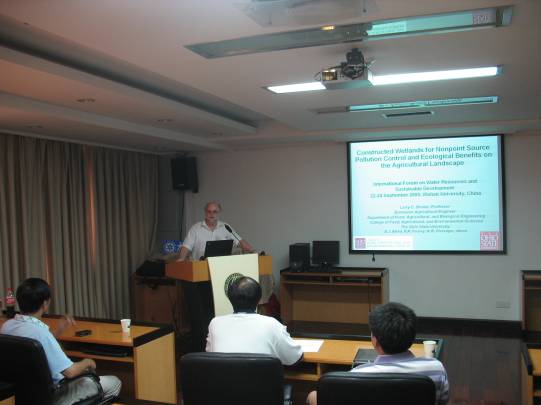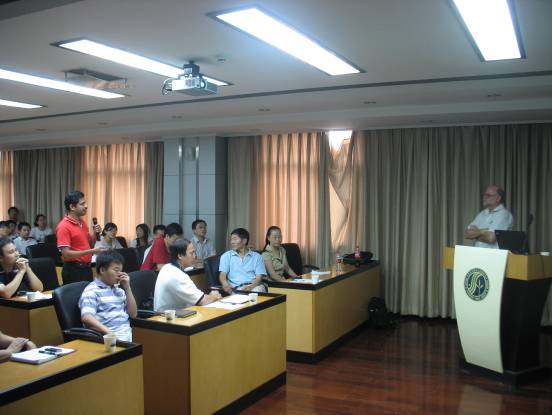
Newsroom
Professor from Ohio State University Visits IHB

Prof. Brown made a presentation entitled “Constructed Wetlands for Nonpoint Source Pollution Control and Ecological Benefits on the Agricultural Landscape” at IHB, Sept. 28, 2009.
Invited by IHB Prof. Zhenbin WU, Prof. Larry C. Brown from Ohio State University paid a visit to our institute for academic exchange on Sept.28, 2009. Prof. Brown made two presentations entitled “Constructed Wetlands for Nonpoint Source Pollution Control and Ecological Benefits on the Agricultural Landscape” and “Managing Agricultural Waters for Water Quality and Quantity Improvements in the Midwest” for scholars and students at IHB. He briefly introduced the influence of America’s agricultural nonpoint source pollution on Gulf of Mexico and Great Lakes region, operational principle and impact of Wetland Reservoir Sub-Irrigation System (WRSIS) as well as the application of this technique in various parts of the world including Ohio and Michigan in America, Guilin and Jingmen in China. His presentation also compared the strengths and weakness between conventional drainage, controlled drainage and subirrigation, thus pointing out their impact on agricultural water management. By economically and hydraulically analyzing the output and numerical stimulation of each kind of irrigation, Prof. Brown pointed out the strength of subirrigation and said that if subirrigation combines constructed wetland, the agricultural output can be elevated and the agricultural water environment can be effectively protected.
Later, Prof. Brown visited some research groups and labs at our institute. Both sides had an in-depth communication on the control of agricultural nonpoint source pollution, personnel exchange and project cooperation etc.
Prof. Brown is the director of the internationally known Overholt Drainage Education and Research Program, the annual Overholt Drainage School, and serves as the Executive Director of the International Program for Water Management in agriculture. His areas of expertise include agricultural water management, development, evaluation and implementation of strategies for managing drainage waters, incorporating agricultural constructed wetlands into agricultural production systems, harvesting, treating, and recycling drainage waters, etc. He has water management (micro-irrigation) project work in India, Uganda, East Africa, and South Africa, and trying to develop water table management, micro-irrigation, and waterlogged and saline affected lands reclamation in India and China. Currently he works with colleagues at Wuhan University, Wuhan, China on paddy systems to harvest runoff waters linked with a constructed wetland for water treatment and recycling.

Prof. Brown also interacted with students and teachers of the institute and clarified their doubts.